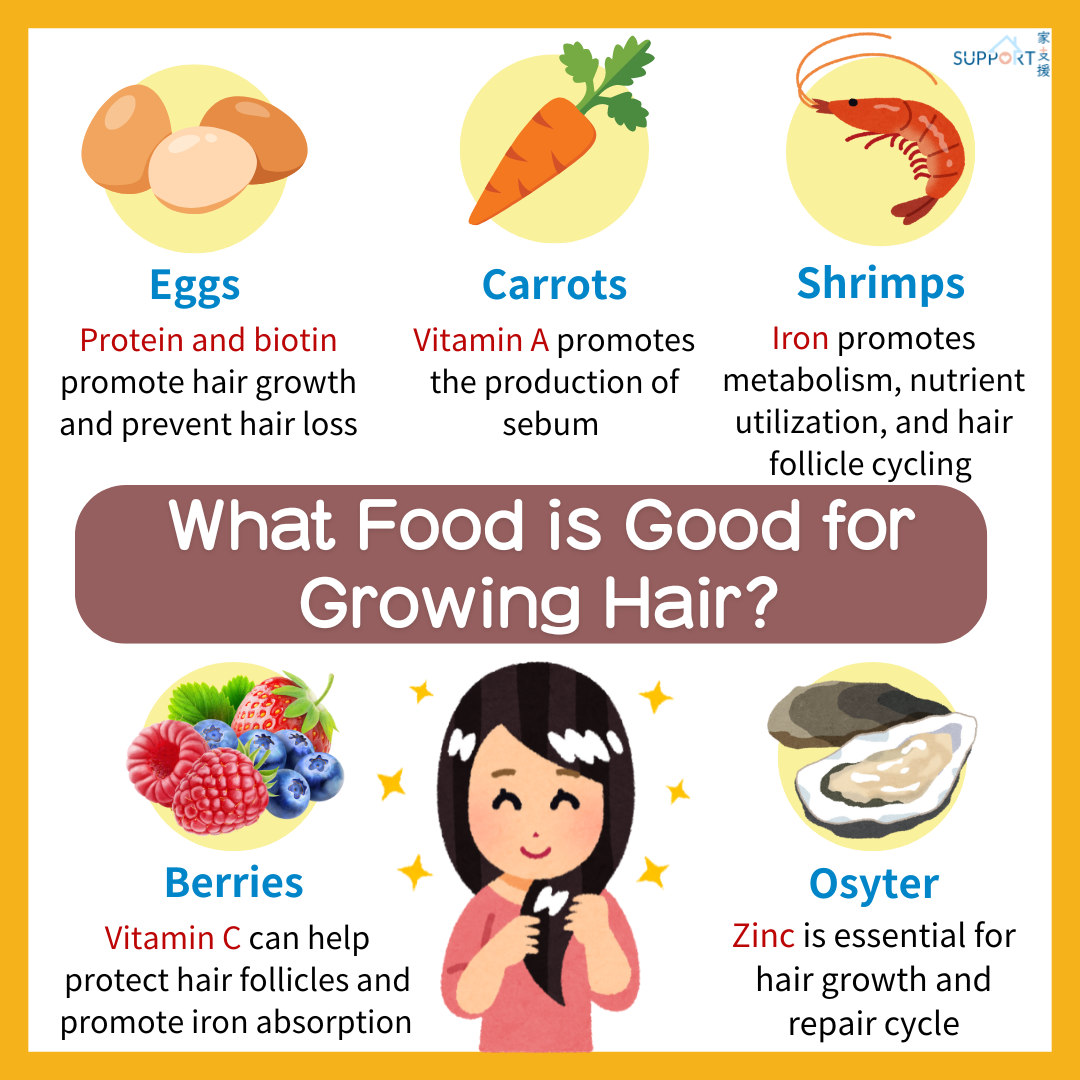Shiny, smooth, and voluminous hair is a symbol of youth, vitality, and well-being. The rate of hair growth and the strength of hair depend on many factors including age, overall health, genetics, environmental exposure, medications, and diet. Although we cannot change heredity factors like age and genetics, one factor we are likely to have more control over is our diet. Inadequate nutrients intakes, such as protein, vitamins A and C, iron, zinc, are suggested linking with hair loss [1]. Thus, what foods are good for hair growth and rich in these nutrients?

1. Eggs
Eggs are rich in protein and biotin, which is a vitamin B. Eating adequate protein is important for hair growth because it is the basic composition of hair follicle. Also, biotin is essential to produce a protein called keratin that can promote hair growth. Low in proteinand/or biotin intake may therefore be associated with hair loss.
2. Carrots
Carrots are high in β-Carotene which is a precursor of vitamin A. Vitamin A is an essential component for cell growth in body, and promotes the production of sebum to form a barrier of skin and keep hair healthy. In addition, vitamin A can increase the rate of hair growth [2]. β-Carotene is also an antioxidant which also has a protective effect to reduce hair loss. Although carrot is a good source of vitamin A, excess intake may lead to hypercarotenemia, characterized by yellow skin discoloration [3].
Tips: if we choose to intake vitamin A via animal sources such as liver, the daily intake should not exceed 3000 ug. For example, vitamin A in 100 g pork liver has already exceeded5000 ug [4].
3. Shrimps
Shrimps are high in iron content. Iron is involved in transporting oxygen in red blood cells. Getting sufficient iron can increase oxygen supply for metabolism, nutrient utilization, and hair follicle cycling [1]. Deficiency of iron will lead to anemia, which is also related to hair loss. For example, 100 g of shrimps can provide 4 mg of iron, which is about 50% of daily need for men and 20% daily need for women. Apart from iron, shrimp is also rich in other nutrients that contribute to hair health such as vitamin B, D and zinc [5].
4. Berries
Berries are rich in vitamin C. Vitamin C is the key nutrient that can help with collagen synthesis and iron absorption to strengthen hair [6]. It also has strong antioxidizing properties to prevent oxidative stress that may damage hair follicles and lead to hair loss [7]. For example, 100 g strawberries can provide 58 mg vitamin C, around 70% of the daily vitamin C needs [6]. Thus, berries have a high level of vitamin C that can support hair growth and prevent it from breaking.
5. Oyster
Oyster is a good source of zinc, which is essential for hair growth and repair cycle. Zinc is involved in protein synthesis, cell division and hormone regulation [1]. One medium size of oyster (50 g) provides 22 mg of zinc. Although hair loss is the common sign for the lack of zinc in the diet, excessive intake of zinc from supplement may also contribute to hair lossdue to imbalance of androgen hormone such as dihydrotestosterone, contributing to hair loss and thinning. The upper limits of zinc intake are 35 mg for women and 45 mg for men [4].
In summary, protein, vitamins A and C, iron, zinc from foods play an important role in the hair follicle growth cycle and in cellular turnover. Eggs, carrots, shrimp, berries and oyster are some good sources of these nutrients.�


